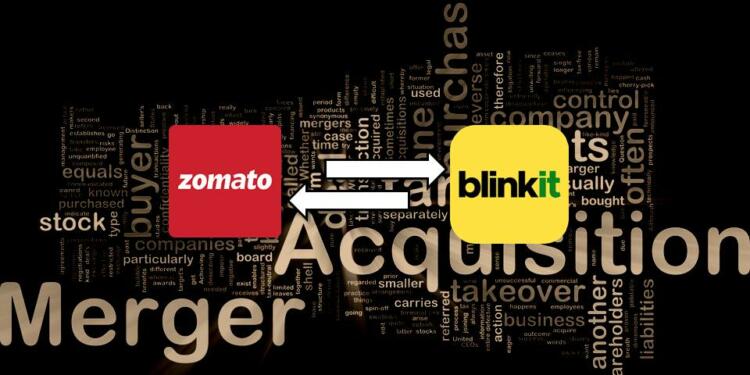The survival of the fittest theory applies to all spheres of life. In the harsh competitive Indian market, where cash flow in startups is drying with the early boom, it becomes very important to manage the balance sheets as well as its product adaptability among customers. After the spring of cash flow, companies are now focusing on sustainability in their overall business and merger & acquisition are one of the instruments of such a goal. According to the latest merger news, Blinkit, the quick commerce delivery company is merging with the food delivery company, Zomato.
The merger
According to reports, Zomato is finally going to acquire the cash-strapped commerce company Blinkit. The proposal of the deal includes, that shareholders of Blinkit will get at least a 10% stake in Zomato. In which SoftBank the largest investor of Blink it will get around a 4% stake.
Reports suggest the merger would not need the Competition Commission of India’s nod for the deal. As Zomato has received a legal opinion that recommends using the ‘de minimis’ exemption as Blinkit’s turnover is less than Rs 1,000 crore.
Earlier CCI in its notice had stated that “acquisitions where enterprises whose control, shares, voting rights, or assets are being acquired have assets of not more than Rs 350 crore in India or a turnover of not more than Rs 1,000 crore in India, are exempt from the regulator’s mergers and acquisitions norms for five years”. So the competition rules are effectively being bypassed.
Read More: How 10 Minute marketing gimmick boomeranged for Zomato
Joint fight for survival
Blinkit’s merger reflects the growing competition in the 10 minutes grocery delivery companies. The new companies like Zepto and Dunzo are giving tough competition to established companies and the conundrum of discounts & offers by start-ups is making the business unsustainable.
The current market capitalization of Zomato is Rs 49996 Crore. In the last year, the company’s share value decreased to about 49%. In the last five years on average, the company is making a loss of around Rs 1000 crore. Its return on equity is around 10% negative.
The introduction of the 10-minute delivery concept has further aggravated the situation. To match the level of competition and retain the fragile Indian customer, it becomes very important to bring a joint fight against competitors. So the merger reflects the same position in this direction.
Read more: Zomato’s nosediving stock prices reaffirm the faith in the market’s intelligence
It is pertinent to mention that the constant competition and cash crunch were forcing the company to raise loans. In that event, Zomato extended the loan at 12% interest. But sustainability in business was still a distant dream.
In a way, the Zomato Blinkit merger reflects the growing consensus to give a joint fight in both the food as well as grocery delivery market. The aim would be to cut short the input cost in the operationality of the company and use the limited resources to bring the balance sheets of the company on track.
























